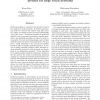Free Online Productivity Tools
i2Speak
i2Symbol
i2OCR
iTex2Img
iWeb2Print
iWeb2Shot
i2Type
iPdf2Split
iPdf2Merge
i2Bopomofo
i2Arabic
i2Style
i2Image
i2PDF
iLatex2Rtf
Sci2ools
112
click to vote
COMAD
2009
2009
Epsilon Equitable Partition: A positional analysis method for large social networks
Positional analysis is considered an important tool in the analysis of social networks. It involves partitioning of the set of actors into subsets such that actors in a subset are similar in their structural relationships with other actors. Traditional methods of positional analysis such as structural equivalence, regular equivalence, and equitable partitions are either too strict or too generic. For real world large graphs, most of these methods result into almost trivial partitions. We propose a useful relaxation to the concept of equitable partition called an epsilon equitable partition. A variant of epsilon equitable partition called maximal epsilon equitable partition is also proposed and formulated as an optimization problem. A fast algorithm for computing epsilon equitable partitions is proposed. We also present the results of performing positional analysis on a number of networks and demonstrate empirically that positional analysis with our notion gives raise to non-trivial an...
COMAD 2008 | COMAD 2009 | Epsilon Equitable Partitions | Equitable Partitions | Positional Analysis |
Related Content
| Added | 09 Nov 2010 |
| Updated | 09 Nov 2010 |
| Type | Conference |
| Year | 2009 |
| Where | COMAD |
| Authors | Kiran Kate, Balaraman Ravindran |
Comments (0)

